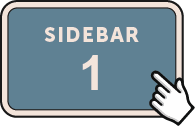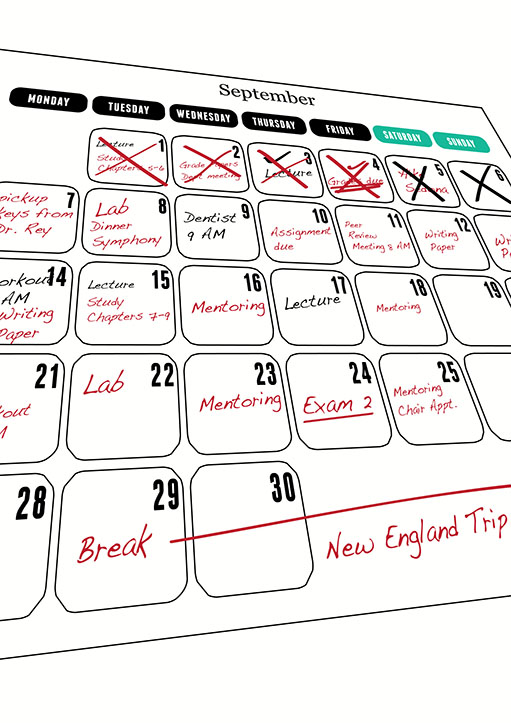Show Navigation Menu
Section One : Foundations of Doctoral Study
Introduction | Time Management | Navigating the Learning Management System |
Basic APA Format and Style | Library Basics | Plagiarism | Conclusion
Chapter 2: Time and Tools
Hide Navigation Menu
Home Page
Section 1 Foundations of Doctoral Study / Chapter 2 Time and Tools

In order to be successful, it is imperative that a learner's family understands the commitment needed regarding support and study time.
Schedules also can reduce stress by helping to decide what learners can and cannot do when there is limited time.

Sidebar 1: Necessary Tools, Technology
2. Time Management
Perhaps the first place to begin developing a personal strategy of success is to consider the involvement and support of family members. It may seem a little strange when discussing time management to talk about family support; however, how one manages time will affect how one's family manages their time, and vice versa. In order to be successful, it is imperative that a learner's family understands the commitment needed regarding support and study time. The best, most efficient time-management system cannot compete with a family’s demand for a learner's time.
After an initial conversation with their family, doctoral learners will need to make a list of all the family, professional, civic, and personal activities in which they currently participate. This list might include food shopping, volunteering, mowing the lawn, attending PTA meetings, attending children’s sporting events, playing sports, listening to music, and exercising among other things. From this list, learners will need to identify those activities in which they will no longer participate or will have another family member perform for them.
Doctoral learners should not make plans regarding how they spend their time without discussing this with their family or support group. Participating or no longer participating in personal activities, sporting events, and professional obligations may require others in a support group or family to assume this additional responsibility as the learner progresses in their program of study. As mentioned in Chapter 1, identifying 20 hours per week for your doctoral studies is challenging and will require the support of the family or support group.


Develop a Schedule
Many people think that a schedule is rigid, inflexible, and generally inhibits them from doing all the things that they want to do. However, when balancing a professional and personal life, a good schedule helps to allocate time to complete the most important activities. Schedules also can reduce stress by helping to decide what learners can and cannot do when there is limited time.
There are five things to remember when developing a schedule:
1. The support of family is critical. Make a schedule well in advance to ensure participation in birthday and anniversary celebrations and other family events. These special events reinforce and strengthen the family bond. Do not miss them.
2. Previously in undergraduate and graduate programs, it may have been possible to write an individual assignment the night before the due date; it is not possible to do this successfully at the doctoral level. Scholarly writing at the doctoral level requires synthesis and reflection, which requires substantially more time. Therefore, doctoral learners should plan to finish the first draft of an individual paper at least two days before the due date. This will provide an additional opportunity to reflect and edit the initial draft of the paper.
3. Weekends provide time for both studying and for family activities. For example, some doctoral learners choose to wake up early on both Saturday and Sunday and work from 5 a.m. to noon. Blocking off time in the morning potentially allows free time for family, personal, or other professional activities from noon to 5 p.m. Then, if more time is needed to study, read, or write, doctoral learners can use part of the weekend evening. Other learners may prefer to use Saturday and Sunday mornings and weekend afternoons as free time to shop, play, and interact with others. This schedule allows learners to allocate several hours later in the day for their studies.
4. Consistency and persistence are critical to success. Doctoral learners should think of themselves as athletes preparing for a marathon, which requires practice and commitment every day. Therefore, they should read, write, or study every day. There will be days when unexpected events occur and completely derail the schedule; however, just as dedicated athletes recover and make the best of the situation by completing a partial workout, so should learners. Each day, learners should spend at least 45 minutes reading or reviewing a draft. Completing even a small task will help learners to make progress. It also will help to reduce personal stress by accomplishing something on a day that was not very productive.
5. Each week, doctoral learners will be exposed to a variety of perspectives, philosophies, and research approaches that will broaden their own understanding of the foundation principles of their discipline. Assigned course readings, student discussions, and independent readings provide a wealth of information that may be difficult to internalize without first spending quiet time to reflect on the linkage and importance of these resources. Therefore, learners should schedule at least 45 minutes of quiet time each week to reflect on what they have read and consider what seems interesting or unexpected. Learners should ask themselves, “What do I not know?” Learners should never conclude this session without identifying three things that need to be investigated. Spending weekly quiet time in this manner can provide great personal growth by helping to make sense of similar and yet conflicting theories and approaches that are presented in the literature. Understanding the differences in the literature is the first step in the identification of a dissertation topic.
Formal scheduling tools
Use of a paper calendar to track professional obligations and family commitments, which may have worked well in the past, may no longer be as effective when adding additional commitments and assignment deadlines necessary to progress in a doctoral program. Weekly submission of written assignments referencing multiple empirical research studies completed over several weeks requires an advanced set of tools to manage one’s schedule. Changes in research focus, increased complexity when drafting doctoral assignments, and longer than anticipated time needed to read empirical research necessitates the use of schedule management techniques, beyond the usefulness of a paper calendar.
There are many very good, easy-to-use, free, schedule management software solutions available for personal computers and even computer tablets. Computer systems usually include calendar management in their email system. On both Apple and Microsoft based computers, doctoral learners may designate specific colors to represent individual task categories, making it easier to view an entire calendar in a single glance. For example, a doctoral learner may designate green for a doctoral written assignment, blue for a family activity, and red for a professional commitment. Once entered, many scheduled activities will change. Therefore, if possible, select a computer based calendar that may also be viewed and updated on your cell phone or tablet. It is advantageous to immediately modify your schedule as needed when it occurs, rather than trying to remember to modify it later. In addition to computer based calendars, there are many calendar management apps that run on Apple and Android devices. As with computer email calendar systems, tablet apps may also be viewed on multiple devices.
Find a Place to Work
In addition to having a plan, doctoral learners should have a place to work. If possible, learners should secure a dedicated work area in their homes that is separate from the rest of the family space. Ideally, this room will have a door, as it will help to provide a quiet space where learners can focus when working. The work area should be comfortable and have all the necessary tools needed to read, write, and reflect.
The work area should be well lit and include a large desk and file storage. A large desk will enable learners to work comfortably, and the file storage will help reduce clutter.